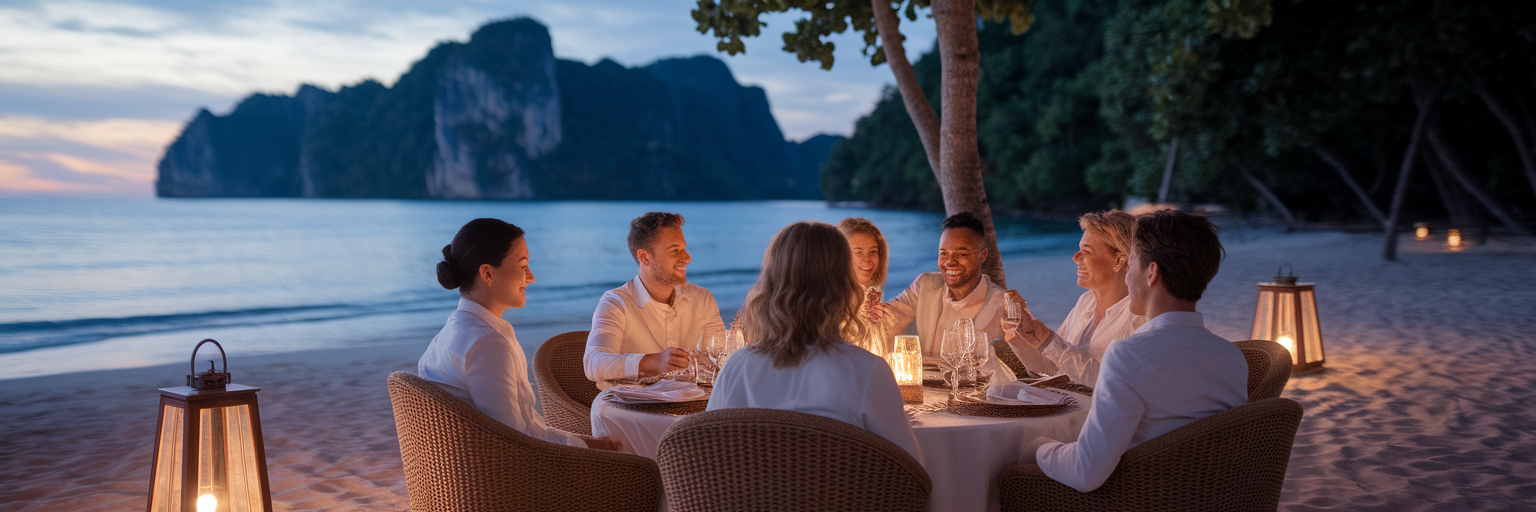Thailand's Off Peak Season is the New Prime Time for Corporate Incentives
Learn the strategic advantages of planning memorable corporate reward trips during Thailand's less crowded travel periods.

Learn the strategic advantages of planning memorable corporate reward trips during Thailand's less crowded travel periods.

The conversation around incentive travel has changed. What was once a simple beach holiday has become a sophisticated tool for motivating and retaining top talent. Today’s high performers seek transformational experiences, not just generic perks. In this context, Thailand's quieter tourism periods present a remarkable strategic opening for discerning corporate planners.
A less crowded environment is the ideal setting to build genuine team connections and deliver high impact programs. Think of the difference between a rushed, noisy group dinner and an intimate gathering where real conversations can happen. This shift allows for deeper engagement and more memorable moments. For planners focused on Thailand MICE travel, this period offers a distinct competitive advantage. It’s a chance to design unparalleled experiences that are simply not possible when every venue is operating at maximum capacity, turning a potential challenge into a powerful opportunity.

Planning a trip during the off-peak season is not just about saving money. It is about maximizing value and elevating the entire experience. While the savings on flights and accommodations are significant, the real benefit lies in how far your budget can stretch. The same investment that might secure standard rooms at a large hotel during peak season could suddenly afford an entire boutique resort or a private yacht charter for your team. This is where you find the ROI for luxury corporate retreats Thailand.
This financial flexibility extends to your negotiating power. Local vendors and partners are often more open to creating bespoke packages and accommodating unique requests when they are not overwhelmed. Imagine securing a private dinner at a sought after restaurant or arranging exclusive access to a cultural site. This flexibility allows for a highly tailored program that maximizes every dollar spent, drawing on a full suite of event services to deliver a higher return. Counter-cyclical planning means your budget works harder, transforming a great trip into an unforgettable one.
| Factor | Peak Season (November - February) | Off-Peak Season (April - October) |
|---|---|---|
| Accommodation Costs | Premium rates for luxury hotels | Up to 30-50% lower rates; room upgrades more likely |
| Venue & Activity Access | High competition; booking required months in advance | Greater availability; possibility of exclusive buyouts |
| Vendor Flexibility | Rigid packages and pricing | Willingness to negotiate and create custom experiences |
| Experience Quality | Crowded sites, longer wait times | Intimate, unhurried, and more authentic interactions |
| Overall ROI | Higher cost for standard experiences | Exceptional value and enhanced employee experience for the budget |
Note: Cost savings are estimates based on industry averages for Thailand's hospitality sector. The table illustrates how planning during the off-peak season provides not just financial savings but also a significant upgrade in the quality and exclusivity of the experience.
Some of the most valuable benefits of off-peak travel are things money cannot always buy: authenticity and exclusivity. We can all picture visiting a famous temple, surrounded by hundreds of other tourists, struggling to hear a guide over the noise. Now, imagine experiencing that same sacred space in near solitude, allowing your team a moment for quiet reflection. This unhurried pace fosters a much deeper connection to the culture and creates memories that last a lifetime.
This is where a Destination Management Company (DMC) becomes essential. During quieter months, a DMC has the access and bandwidth to arrange truly exclusive corporate experiences Thailand. This shift aligns with broader industry trends, where the focus of incentive travel is moving away from simple rewards towards creating extraordinary and memorable journeys, a finding echoed in a comprehensive report on incentive travel in Asia by SITE Global. These are not standard tourist activities. Instead, they are curated moments designed for impact:
This is where the expertise of a professional team becomes invaluable, as they understand how to transform logistical possibilities into powerful emotional moments. If you're wondering why you need an event planner for such a trip, the answer lies in their ability to unlock this hidden layer of exclusivity and personalization.

An off-peak incentive trip can be a powerful statement of your company’s values. By choosing to travel during quieter months, you are already making a positive impact. You are helping to reduce the environmental strain on popular destinations and supporting a more stable, year-round tourism economy for local communities. This approach turns a corporate trip into a demonstration of your commitment to responsible business practices.
The opportunity for meaningful engagement goes even further. A well-designed program can incorporate purposeful activities that align with your company’s social responsibility goals. This is the core of sustainable incentive travel. Instead of just observing, your team can actively participate in projects that leave a lasting positive legacy. Consider these possibilities:
To make this work, it is essential to vet your partners carefully. Our experience proves that working with eco-certified hotels, responsible tour operators, and venues committed to waste reduction is non-negotiable. This ensures your investment supports businesses that share your values, adding a profound layer of purpose to your incentive program.
So, how do you bring all these elements together? The key is to design a program with a clear theme that leverages both Thailand’s unique strengths and the benefits of the off-peak environment. Instead of a generic itinerary, build the trip around a central concept like wellness, leadership, or innovation.
For a wellness theme, you could use the country’s world-class spa culture to host private mindfulness workshops and guided meditation sessions that help your team genuinely recharge. For leadership, the exclusivity of the off-peak season enables complex team-building activities that would be impossible in a crowd, such as a private Amazing Race-style challenge through Bangkok’s canals or a collaborative sailing regatta off the coast of Phuket.
Ultimately, planning corporate travel to Thailand with a strategic, off-peak mindset is an investment in your most valuable asset: your people. A thoughtfully designed trip in a quieter, more authentic setting builds loyalty and inspires performance far more effectively than a standard vacation. Executing a program with this level of detail and impact requires a partner dedicated to creating unforgettable moments, and we invite you to see how we make it happen.